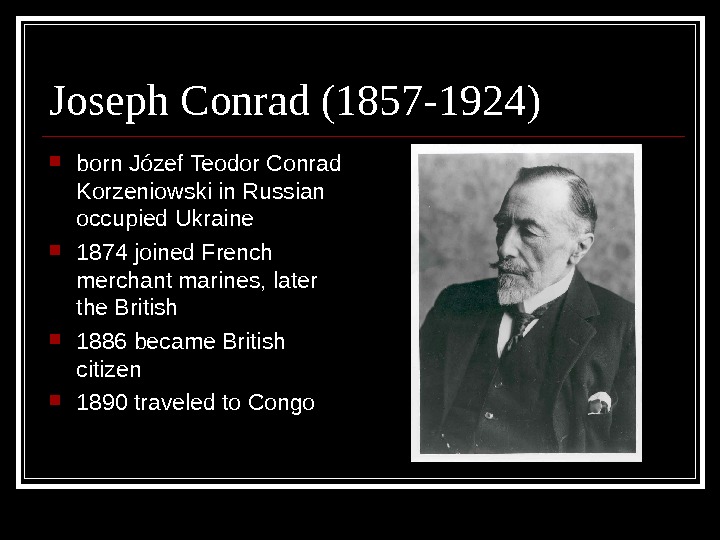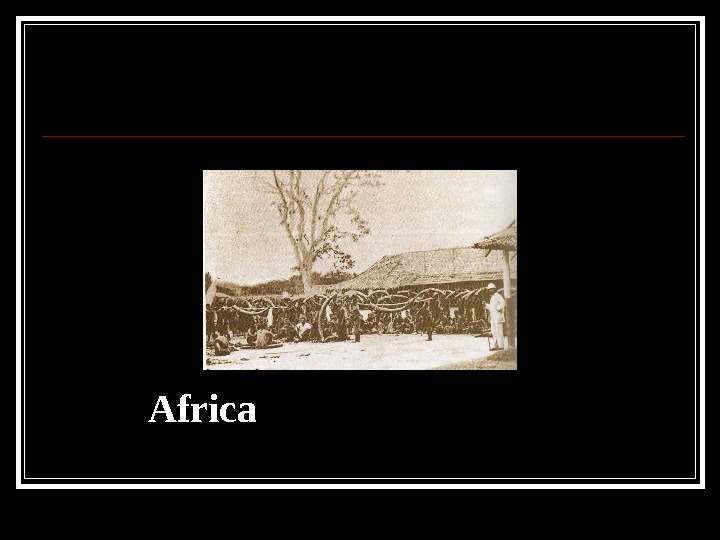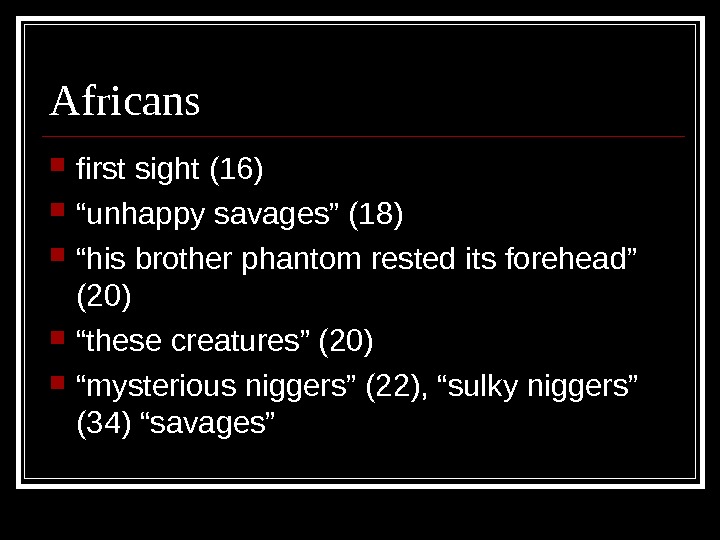Modernism Prevalent in the period between the two


























modernism_and_joseph_conrad.ppt
- Размер: 3.1 Mегабайта
- Количество слайдов: 25
Описание презентации Modernism Prevalent in the period between the two по слайдам
 Modernism Prevalent in the period between the two World Wars (but also before and after)
Modernism Prevalent in the period between the two World Wars (but also before and after)
 In general the term indicates : A rejection of the 19 th -Century literary tradition (including Realism, Naturalism) a wide range of experimental and avant-garde trends (all the –isms: dadaism, surrealism, expressionism, futurism, etc. ) A reaction to the modern, urban experience A rejection of bourgeois values
In general the term indicates : A rejection of the 19 th -Century literary tradition (including Realism, Naturalism) a wide range of experimental and avant-garde trends (all the –isms: dadaism, surrealism, expressionism, futurism, etc. ) A reaction to the modern, urban experience A rejection of bourgeois values
 Compare:
Compare:
 And: Portrait of Picasso by Juan Gris
And: Portrait of Picasso by Juan Gris
 Or: Georges Braque, Girl with a Cross
Or: Georges Braque, Girl with a Cross
 OR: Picasso, Blanquita Su árez (1917)
OR: Picasso, Blanquita Su árez (1917)
 Modernism Discontinuity and fragmentation Juxtaposition and multiple points of view Lack of a unitary self “ Self” is seen as artificial, a social fiction of undetermined status Individual is stripped of the traditional defining categories of personhood Weeping Woman (1937)
Modernism Discontinuity and fragmentation Juxtaposition and multiple points of view Lack of a unitary self “ Self” is seen as artificial, a social fiction of undetermined status Individual is stripped of the traditional defining categories of personhood Weeping Woman (1937)
 Modernist fiction crisis attempts to represent the underlying, multiplicitous truths of consciousness & psyche rejection of external, unitary, coherent appearance of realist conventions lack of causality insufficiency of language oppositional relations between the individual and the social, alienation antibourgeois first person narrator, often unreliable A sense of urban dislocation and alienation works by male writers tend to be misogynistic
Modernist fiction crisis attempts to represent the underlying, multiplicitous truths of consciousness & psyche rejection of external, unitary, coherent appearance of realist conventions lack of causality insufficiency of language oppositional relations between the individual and the social, alienation antibourgeois first person narrator, often unreliable A sense of urban dislocation and alienation works by male writers tend to be misogynistic
 Joseph Conrad Heart of Darkness
Joseph Conrad Heart of Darkness
 Joseph Conrad (1857 -1924) born Józef Teodor Conrad Korzeniowski in Russian occupied Ukraine 1874 joined French merchant marines, later the British 1886 became British citizen 1890 traveled to Congo
Joseph Conrad (1857 -1924) born Józef Teodor Conrad Korzeniowski in Russian occupied Ukraine 1874 joined French merchant marines, later the British 1886 became British citizen 1890 traveled to Congo
 Major works: The Nigger of the Narcissus (1897) Lord Jim (1900) Nostromo (1904) The Secret Agent (1907) The Secret Sharer (1909)
Major works: The Nigger of the Narcissus (1897) Lord Jim (1900) Nostromo (1904) The Secret Agent (1907) The Secret Sharer (1909)
 Heart of Darkness (1899, 1902) Central questions: What is Conrad saying about European imperialism / civilization? How are we to read this text? Should we read it at all? “ The title I am thinking of is ‘The Heart of Darkness’ but the narrative is not gloomy. The criminality of inefficiency and pure selfishness when tackling the civilising work in Africa is a justifiable idea. The subject is of our time distinc[t]ly – though not topically treated. » ( Collected Letters 2: 139 -40).
Heart of Darkness (1899, 1902) Central questions: What is Conrad saying about European imperialism / civilization? How are we to read this text? Should we read it at all? “ The title I am thinking of is ‘The Heart of Darkness’ but the narrative is not gloomy. The criminality of inefficiency and pure selfishness when tackling the civilising work in Africa is a justifiable idea. The subject is of our time distinc[t]ly – though not topically treated. » ( Collected Letters 2: 139 -40).
 The frame: first narrator view of England? (5 vs. 6 -7) conquest (7 -8) set up of Marlow’s narrative his audience Marlow
The frame: first narrator view of England? (5 vs. 6 -7) conquest (7 -8) set up of Marlow’s narrative his audience Marlow
 In 4 groups, discuss the following. Find at least 3 significant quotes for each. Characterization of: 1. Europe 2. Europeans 3. Africa 4. Africans
In 4 groups, discuss the following. Find at least 3 significant quotes for each. Characterization of: 1. Europe 2. Europeans 3. Africa 4. Africans

![Europe “ And this also, […] has been one of the dark places of the earth” Europe “ And this also, […] has been one of the dark places of the earth”](/docs//modernism_and_joseph_conrad_images/modernism_and_joseph_conrad_15.jpg) Europe “ And this also, […] has been one of the dark places of the earth” (5) London and gloom the Continent “not so nasty as it looks” (9) Brussels? “whited sepulchre” (11) “ a city of the dead” (13)
Europe “ And this also, […] has been one of the dark places of the earth” (5) London and gloom the Continent “not so nasty as it looks” (9) Brussels? “whited sepulchre” (11) “ a city of the dead” (13)
 Europeans bizarre, absurd behavior (16, 17, 19, 25) the chief accountant (21) the general manager (25) “ faithless pilgrims” (27, 29) fist class agent (28) backbiting and intriguing (29) the Eldorado Exploring Expedition (37)
Europeans bizarre, absurd behavior (16, 17, 19, 25) the chief accountant (21) the general manager (25) “ faithless pilgrims” (27, 29) fist class agent (28) backbiting and intriguing (29) the Eldorado Exploring Expedition (37)
 European values? Marlow “did not represent his class” (5) efficiency (7) “ backbone” “character” (21) Marlow and lies (32) the work (34) manners (35)
European values? Marlow “did not represent his class” (5) efficiency (7) “ backbone” “character” (21) Marlow and lies (32) the work (34) manners (35)
 Africa
Africa
 Africa “ a white patch for a boy to dream gloriously over” (9) first sight: “a God forsaken wilderness” (15) “ gloomy circle of some Inferno” (19) “ silent wilderness […] like evil or truth waiting” (26) “ the wilderness without a sound took him into its bosom again” (28) primeval mud, primordial forest (31) “ I felt how big, how confoundedly big, was that thing that couldn’t talk” (32)
Africa “ a white patch for a boy to dream gloriously over” (9) first sight: “a God forsaken wilderness” (15) “ gloomy circle of some Inferno” (19) “ silent wilderness […] like evil or truth waiting” (26) “ the wilderness without a sound took him into its bosom again” (28) primeval mud, primordial forest (31) “ I felt how big, how confoundedly big, was that thing that couldn’t talk” (32)
 Africans first sight (16) “ unhappy savages” (18) “ his brother phantom rested its forehead” (20) “ these creatures” (20) “ mysterious niggers” (22), “sulky niggers” (34) “savages”
Africans first sight (16) “ unhappy savages” (18) “ his brother phantom rested its forehead” (20) “ these creatures” (20) “ mysterious niggers” (22), “sulky niggers” (34) “savages”
 Achebe’s critique: Forum Africa as “the other world”, antithesis of Europe (lack of) language and Africans (49, 83) fear of “kinship” with Africans (44) lack of history (43 -44, 50) Africa as symbolic setting dehumanization of Africans (“it” 20, fragmented 55, “not inhuman” 44, “it” 81) racism underlying the colonial enterprise Kurtz’s madness due to contact with Africa (59, 60, 72, 82)
Achebe’s critique: Forum Africa as “the other world”, antithesis of Europe (lack of) language and Africans (49, 83) fear of “kinship” with Africans (44) lack of history (43 -44, 50) Africa as symbolic setting dehumanization of Africans (“it” 20, fragmented 55, “not inhuman” 44, “it” 81) racism underlying the colonial enterprise Kurtz’s madness due to contact with Africa (59, 60, 72, 82)
 Kurtz: a “remarkable man” (22) painting (29 -30) progress” (30) “ All Europe contributed to the making of Kurtz” (61) The report (61 -62) his “talk” (58) vs. the helmsman (62) lacked restraint vs. the cannibals (72) The posts (71 -72) “ the spell […] of the wilderness” (82) mad soul (83) His final words (86)
Kurtz: a “remarkable man” (22) painting (29 -30) progress” (30) “ All Europe contributed to the making of Kurtz” (61) The report (61 -62) his “talk” (58) vs. the helmsman (62) lacked restraint vs. the cannibals (72) The posts (71 -72) “ the spell […] of the wilderness” (82) mad soul (83) His final words (86)
 Characterization of women: Forum the aunt: “out of touch with the truth” (14) the mistress (75 -76, 84) the Intended (59, 88, 92, 95)
Characterization of women: Forum the aunt: “out of touch with the truth” (14) the mistress (75 -76, 84) the Intended (59, 88, 92, 95)
 What does the title refer to? Look for mentions of “darkness”: London (3, 96) Ancient Britain (6 -7) Africa (9, 40, 43, 84, 96) and Kurtz (60, 85, 86, 87, 91) and the Intended (93) Choice of “nightmares”? (17, 78, 80, 85, 87) Ending?
What does the title refer to? Look for mentions of “darkness”: London (3, 96) Ancient Britain (6 -7) Africa (9, 40, 43, 84, 96) and Kurtz (60, 85, 86, 87, 91) and the Intended (93) Choice of “nightmares”? (17, 78, 80, 85, 87) Ending?

